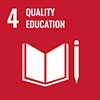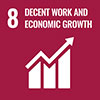Elisenda Paluzie: «We can't go on teaching economics as if nothing had happened over the last 20 years»
In this interview Elisenda Paluzie analyses the origins of the so-called Post Crash movement in Catalonia and the effects on a renowned institution such as the one she heads: the Faculty of Economics and Business at the University of Barcelona (UB). Paluzie believes this critical movement, which began following the recent economic crisis, is principally rooted in a lack of plurality in teaching, which can be based on three elements: theory, methodology and interdisciplinarity. She comments on how these three factors are treated in her faculty and ends on the need for the teaching of economics to evolve. In this regard she highlights ‘The core Project’, an initiative with a goal to reset the approach to economics teaching with new coursebooks, in the belief that the materials currently holding sway continue to approach matters as if during the last 20 years nothing had occurred.
ODS



 Carolina Hintzmann
Carolina HintzmannProfessor in Economic and Business Studies (UOC). Doctorate in Economics from the University of Barcelona and a degree in Economic and Business Studies from the same university. Head of the Economy degree of Economic and Business Studies at the UOC and coordinator of international mobility of said studies. Her areas of specialization are in the field of macroeconomy, economic growth and work productivity. Member of the research group Finance, Management & Macroeconomics (FM2).
 Joan Miquel Gomis
Joan Miquel GomisDirector of Oikonomics magazine. Aggregate Professor of Economic and Business Studies (UOC). He has been the academic director of the Tourism postgraduate and the degree (UOC) in the period 2006-2017. Doctor by the Department of Economics and Business Organization (UB). Bachelor of Information Science (UAB). His teaching and research (in the UOC’s NOUTUR group) focuses on the field of tourism in the application of ICTs to marketing, innovation and quality, sustainability and responsibility, destination management and public tourism management.



